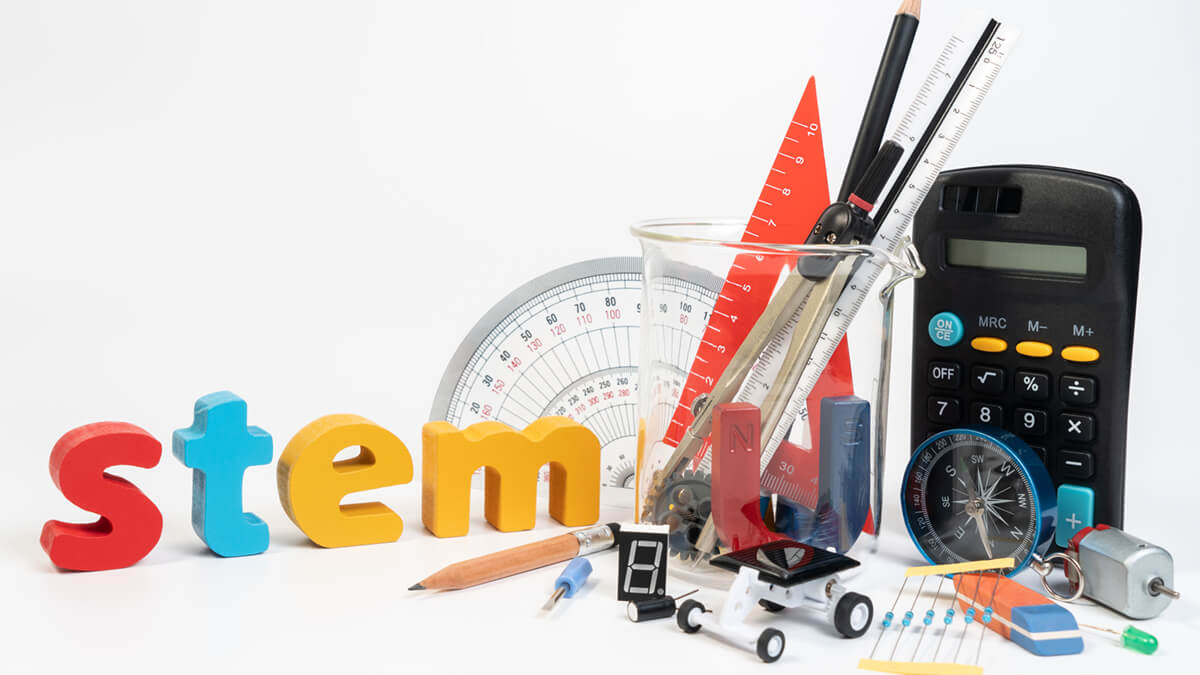Science, technology, engineering, and mathematics—the four ingredients that make up STEM. It is these elements that many consider key to America’s innovation, global competitiveness, and national security. What will the future look like if there are no students interested in pursuing STEM careers? It’s a question that raises concern as the U.S. falls behind internationally, ranking 30th in math and 19th in science among industrialized nations.*
The U.S. Department of Education reports that only 16% of American high school seniors are proficient in math and interested in a STEM career. Even among those who do go on to pursue a STEM major in college, only about half choose to work in a related career.† According to Teach For America, there will be 8 million STEM jobs available in the U.S. by 2018 but a vast majority of graduates will be unprepared to fill them.‡ What the country needs is more STEM teachers to not only educate America’s youth in these critical areas but also to energize and instill a sense of confidence and passion for pursuing STEM majors in college that lead to STEM careers.
Sounds simple, but it’s challenging. Judith Fraivillig, associate professor at Rider University, says kids tend to make up their minds about whether they like or dislike math and science by the fourth grade.‡ Those who decide they dislike STEM by age 10 are less likely to become a scientist, engineer, or innovator. The key is having enough STEM teachers to reach all students—regardless of socioeconomic status, zip code, or ethnicity—in order to inspire and prepare them to reach their full potential.
Excellent Teachers Needed for STEM Education
In 2011, President Barak Obama called on the nation to develop, recruit, and retain 100,000 excellent STEM teachers over the next 10 years. He also asked colleges and universities to graduate an additional 1 million students with STEM majors. The Department of Education says these goals can only be met if Hispanics, African Americans, and other underrepresented groups in the STEM fields—including women, people with disabilities, and first-generation Americans—are robustly engaged and supported in learning and teaching in these areas.†
Those who wish to accept this call to action and become STEM teachers can enter America’s school systems two ways. Working professionals who were STEM majors in chemistry, biology, physics, calculus, engineering, or any other STEM major, and went on to pursue a career in that field, can transition to a career in education. STEM careerists will need to undergo teacher training and may be asked to complete a subject area knowledge test in addition to the basic skills test of reading, writing, and math.
Alternately, educators earning a master’s degree in education with a specialization in STEM are well positioned to land coveted spots at primary and secondary schools. While the debate continues around the impact of a master’s degree on improving teacher effectiveness, a Walden University study, Master’s Degrees and Teacher Effectiveness: New Evidence From State Assessments, suggests earning a master’s degree does help make a difference in student outcomes irrespective of area of study. An MS in Education (MSEd) degree can help teachers deepen their understanding of cultural and linguistic diversity, and develop the skills needed to adapt to various learning and language styles. An MSEd also provides educators an opportunity to learn how to leverage assessment data to become instructional leaders.
Earning a STEM education specialization can prepare certified educators to more effectively teach, engage, and inspire students in the STEM fields. In addition, teachers can learn strategies to help diverse student populations become critical thinkers and build the educational foundation for future STEM-related careers.
Regardless of the path chosen to become a STEM educator, teachers should be engaged and enthusiastic, using hands-on and minds-on activities. Making science and math courses fun and interesting will not only help students learn, but might also plant a seed of interest that could grow into an exciting and rewarding STEM career.§
Walden University is an accredited institution offering online education bachelor’s, master’s, and doctoral degree programs, including a MS in Education with a specialization in STEM Education (Grades K–8). Expand your career options and earn your degree in a convenient, flexible format that fits your busy life.
*D. Desilver, U.S. students’ academic achievement still lages that of their peers in many other countries, Pew Research Center, on the internet at http://www.pewresearch.org/fact-tank/2017/02/15/u-s-students-internationally-math-science/.
*U.S. Department of Education, Science, Technology, Engineering and Math: Education for Global Leadership, on the Internet at www.ed.gov/stem.
†Teach For America, Science, Technology, Engineering, and Math (STEM) Initiative, on the Internet at www.teachforamerica.org/about-us/our-initiatives/stem-initiative.
‡P. Kavilanz, Wanted: 100,000 New STEM Teachers, CNN Money, on the Internet at money.cnn.com/2015/11/13/smallbusiness/stem-teachers-100kin10.
§Science Pioneers, Why STEM Education Is Important for Everyone, on the Internet at www.sciencepioneers.org/parents/why-stem-is-important-to-everyone.
Walden offers both state-approved educator licensure programs as well as programs and courses that do not lead to licensure or endorsements. Prospective students must review their state licensure requirements prior to enrolling. For more information, please refer to www.WaldenU.edu/educlicensure.
Prospective Alabama students: Contact the Teacher Education and Certification Division of the Alabama State Department of Education at 1-334-242-9935 or alabamaachieves.org to verify that these programs qualify for teacher certification, endorsement, and/or salary benefits.
Note to all Washington residents: This program is not intended to lead to teacher certification. Teachers are advised to contact their individual school districts as to whether this program may qualify for salary advancement.
Walden University is accredited by The Higher Learning Commission, 1-800-621-7440, www.hlcommission.org.




